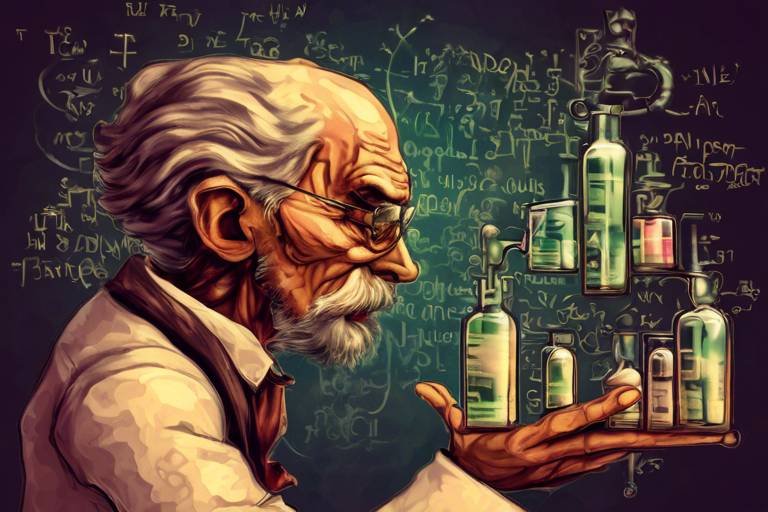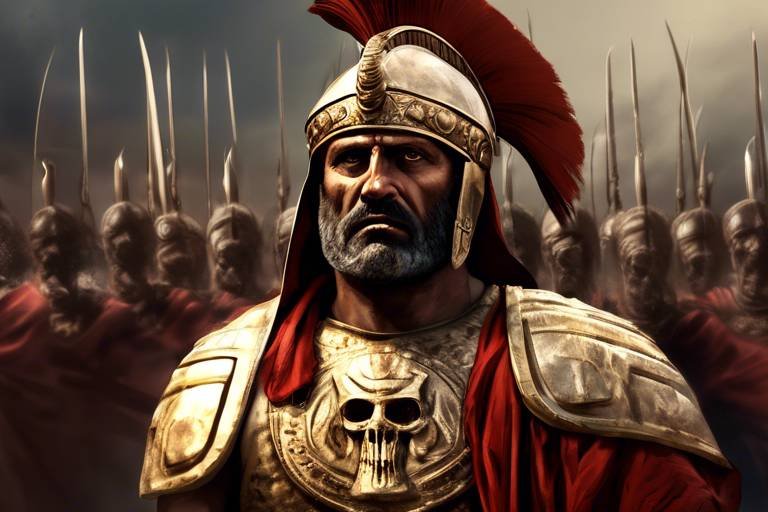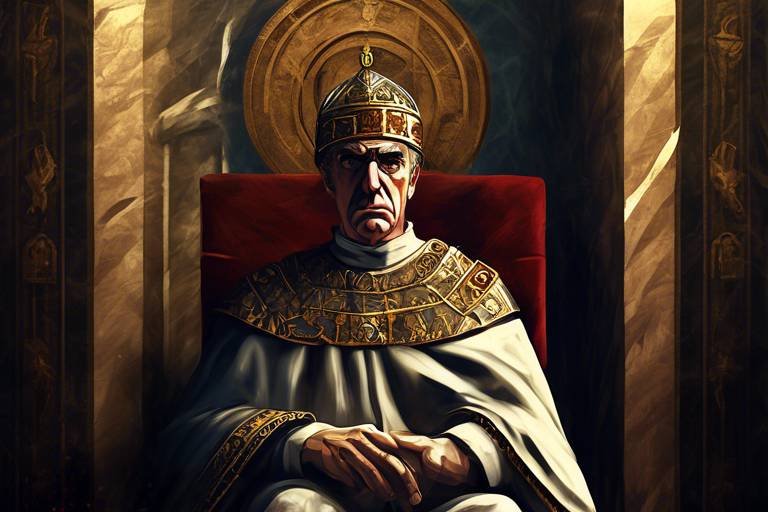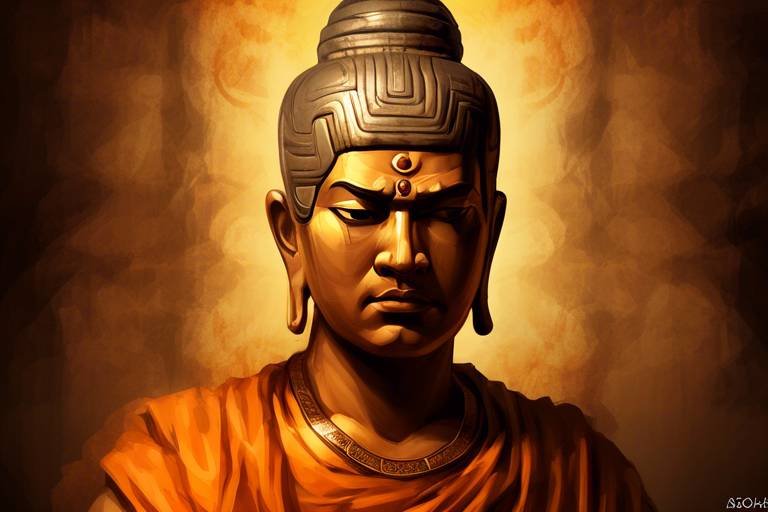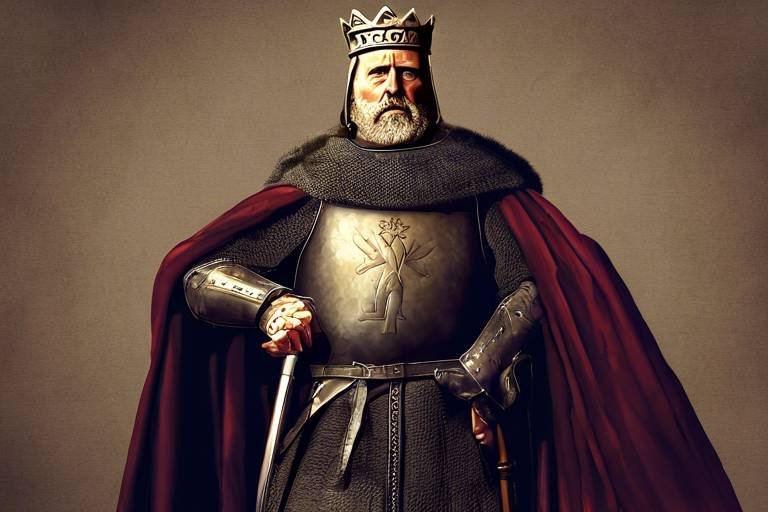Henry IV: The King Who Ended the French Wars of Religion
Henry IV, also known as Henry of Navarre, was a pivotal figure in French history, renowned for his role in bringing an end to the tumultuous period of the French Wars of Religion. Born in 1553, Henry IV navigated a complex political landscape to ascend to the French throne, facing numerous challenges along the way. His reign marked a significant turning point in French history, characterized by religious tolerance, military prowess, and economic reforms that laid the foundation for a more stable and prosperous France.
As a young prince, Henry IV was raised in the Protestant faith amidst the religious conflicts that plagued France during the 16th century. Despite facing opposition due to his religion, he eventually converted to Catholicism to secure his claim to the throne. In 1589, Henry IV became King of France, inheriting a kingdom torn apart by religious strife and civil war. His pragmatic approach to governance and his willingness to compromise played a crucial role in ending decades of bloodshed and division.
One of Henry IV's most enduring legacies was his policy of religious tolerance, exemplified by the landmark Edict of Nantes issued in 1598. This edict granted substantial rights to the Protestant minority in France, allowing for freedom of worship and effectively ending the religious conflicts that had ravaged the country for years. The Edict of Nantes marked a significant step towards reconciliation and paved the way for a more harmonious society.
Henry IV's military campaigns were equally remarkable, as he displayed strategic acumen and leadership on the battlefield. His victories, such as the Battle of Ivry in 1590, solidified his authority and helped stabilize the kingdom. Through a combination of military strength and diplomatic finesse, Henry IV managed to consolidate his power and extend his influence throughout France, earning him the reputation of a skilled and visionary ruler.
In addition to his military achievements, Henry IV implemented sweeping economic reforms and infrastructure development projects aimed at revitalizing the French economy. He promoted agriculture, trade, and industry, fostering growth and prosperity across the kingdom. His efforts to improve roads, bridges, and public works infrastructure contributed to the overall well-being of the population and laid the groundwork for future economic expansion.
Tragically, Henry IV's reign was cut short by his assassination in 1610, a shocking event that sent shockwaves throughout France. Despite his untimely death, Henry IV's legacy endured, leaving an indelible mark on French history. His reign is remembered as a time of relative peace and prosperity, characterized by tolerance, innovation, and progress.
Henry IV's historical significance cannot be overstated, as his contributions to France continue to be studied and celebrated to this day. His legacy as a peacemaker, reformer, and visionary leader has earned him a revered place in the annals of history, with scholars and historians recognizing his enduring impact on the shaping of modern France.
Throughout the centuries, Henry IV has been immortalized in literature, art, and popular culture, with numerous depictions showcasing his legendary status. From paintings and sculptures to plays and novels, Henry IV's story has inspired countless artists and creators, cementing his place as a cultural icon whose legacy transcends time and borders.
In modern-day France, Henry IV is commemorated and honored through various monuments, celebrations, and cultural events that pay tribute to his enduring legacy. From statues and plaques to annual festivals and reenactments, the memory of Henry IV lives on in the hearts and minds of the French people, serving as a reminder of a bygone era marked by resilience, innovation, and progress.

Early Life and Ascension to the Throne
Henry IV, born as Henry of Navarre, had a tumultuous journey to the French throne. Growing up in the politically charged atmosphere of 16th-century France, he faced numerous challenges that shaped his character and leadership style. Despite being raised as a Protestant in a predominantly Catholic country, Henry navigated the complexities of religious tensions with tact and diplomacy.
Upon ascending to the throne in 1589, Henry IV faced fierce opposition from various factions vying for power in France. His legitimacy as king was contested, leading to a protracted struggle for control. However, through a combination of military prowess and strategic alliances, Henry managed to consolidate his rule and establish himself as a formidable monarch.
Henry IV's path to kingship was marked by perseverance and resilience. His ability to adapt to changing circumstances and win the loyalty of his subjects set him apart as a visionary leader. Despite facing assassination attempts and internal strife, Henry's determination to bring stability and unity to France never wavered.
As Henry IV grappled with the challenges of ruling a divided kingdom, his early life experiences and political acumen played a crucial role in shaping his approach to governance. His commitment to religious tolerance and reconciliation set the stage for a new era of peace and prosperity in France, ultimately earning him the title of the "Green Gallant."

Religious Tolerance and the Edict of Nantes
Henry IV's reign was marked by a remarkable policy of religious tolerance that aimed to bring peace to a divided France. One of his most significant actions in this regard was the issuance of the Edict of Nantes in 1598. This groundbreaking edict granted freedom of worship to the Huguenots, a Protestant minority in France, allowing them to practice their religion openly without fear of persecution.
The Edict of Nantes was a pivotal moment in French history as it effectively ended decades of religious conflict that had torn the nation apart. By promoting coexistence between Catholics and Protestants, Henry IV sought to heal the wounds of the past and restore stability to the kingdom.
Through the Edict of Nantes, Henry IV not only demonstrated his commitment to religious freedom but also his wisdom in understanding that unity was essential for the prosperity of France. This bold move set a precedent for tolerance and acceptance that would shape the future of the country.
Despite facing opposition from some factions within the Catholic Church and the nobility, Henry IV's vision of a unified and peaceful France prevailed. The Edict of Nantes not only secured religious rights for the Huguenots but also paved the way for a more inclusive society where diversity was embraced.
Henry IV's legacy as a champion of religious tolerance and the architect of the Edict of Nantes endures to this day, serving as a beacon of hope for those who believe in the power of compassion and understanding in building a harmonious society.

Military Campaigns and Achievements
Henry IV, also known as Henry of Navarre, was a pivotal figure in French history who played a significant role in bringing an end to the tumultuous period of the French Wars of Religion. His reign was marked by a series of military campaigns, religious tolerance policies, economic reforms, and lasting impacts on French society.
Henry IV was born in 1553 in the Kingdom of Navarre, a small territory in present-day Spain. Despite facing challenges and political turmoil during his upbringing, he eventually ascended to the French throne in 1589 after the death of Henry III. His reign began amidst a fractured France torn apart by religious conflicts between Catholics and Protestants.
One of Henry IV's most notable achievements was his policy of religious tolerance, culminating in the Edict of Nantes in 1598. This landmark decree granted religious freedom to the Huguenots, ending decades of religious warfare and promoting unity within the kingdom.
Henry IV's military campaigns were instrumental in stabilizing France and solidifying his rule. Through strategic alliances and decisive victories, he effectively quelled internal rebellions and external threats, securing the borders of his kingdom. His military prowess and diplomatic skills were evident in his successful sieges and battles, such as the Battle of Ivry in 1590.
Furthermore, Henry IV's famous quote, "Paris is well worth a mass," exemplifies his pragmatic approach to governance, showcasing his willingness to convert to Catholicism to secure the loyalty of his subjects and bring peace to the realm.
In addition to his military endeavors, Henry IV implemented significant economic reforms and infrastructure projects aimed at revitalizing France's economy and improving the lives of its citizens. His policies focused on promoting trade, agriculture, and industry, laying the foundation for future prosperity in the kingdom.
Tragically, Henry IV's reign was cut short by his assassination in 1610 by a fanatical Catholic zealot. Despite his untimely death, his legacy endured, leaving a lasting impact on French history and culture. His efforts to promote religious tolerance and foster national unity continued to shape the course of the nation long after his passing.
Henry IV's legacy is a complex tapestry of military achievements, political reforms, and cultural influences that have left an indelible mark on France. Historians continue to debate his place in history, with some lauding his contributions to the nation's stability and others critiquing his methods of governance. Nevertheless, his reign remains a pivotal era in French history.
Throughout the centuries, Henry IV has been immortalized in literature, art, and popular culture as a symbol of resilience and leadership. From Shakespeare's portrayal of him in "Henry IV, Part 1" to modern-day films and television series, his legacy continues to captivate audiences and inspire creative interpretations of his life and reign.
In modern-day France, Henry IV is commemorated through various monuments, celebrations, and cultural events that honor his contributions to the nation. His statues adorn public squares, his legacy is celebrated in annual festivals, and his memory is kept alive through educational initiatives that highlight his enduring impact on French society.

Economic Reforms and Infrastructure Development
Henry IV, known for his visionary leadership, implemented significant economic reforms and spearheaded infrastructure development in France during his reign. His initiatives aimed to uplift the economy and enhance the living standards of his people. One of his key economic reforms was the restructuring of taxation policies to ensure fairness and boost revenue for the crown. By streamlining the tax system, Henry IV aimed to create a more stable financial foundation for the kingdom.
Moreover, Henry IV focused on promoting trade and commerce both domestically and internationally. He encouraged the growth of industries, supported local businesses, and fostered trade agreements with other nations. This proactive approach not only stimulated economic growth but also strengthened France's position in the global market.
Infrastructure development was another crucial aspect of Henry IV's reign. He initiated ambitious projects to improve transportation networks, construct bridges, roads, and canals, and modernize urban centers. These infrastructure developments not only facilitated communication and transportation within the kingdom but also laid the groundwork for future progress and expansion.
Furthermore, Henry IV's emphasis on agricultural reforms aimed to enhance productivity and ensure food security for the population. By implementing innovative farming techniques and supporting agricultural research, he sought to increase agricultural output and improve the overall well-being of the rural communities.
In addition to his economic and infrastructure reforms, Henry IV also promoted education and cultural development. He founded schools, supported artists and scholars, and patronized cultural institutions to enrich the intellectual and artistic landscape of France. This holistic approach to governance underscored Henry IV's commitment to the prosperity and advancement of his kingdom.
Overall, Henry IV's economic reforms and infrastructure development initiatives not only revitalized the French economy but also laid the foundation for future growth and prosperity. His forward-thinking policies and investments in key sectors continue to shape the economic landscape of France to this day.

Assassination and Legacy
Henry IV's reign came to a tragic end with his assassination on May 14, 1610, by a fanatical Catholic named François Ravaillac. The King's death shocked the nation and left a void that was not easily filled. Despite his untimely demise, Henry IV's legacy continued to shape France for years to come.
The assassination of Henry IV marked the end of an era of relative peace and prosperity in France. His death plunged the country into a period of uncertainty and instability, as his successors struggled to maintain the progress he had made during his reign. The loss of such a beloved and visionary leader was deeply felt by the French people, who mourned the passing of their "Good King Henry."
Henry IV's legacy, however, endured long after his death. His policies of religious tolerance and reconciliation laid the foundation for a more united and cohesive France. The Edict of Nantes, issued in 1598, granted religious freedom to Protestants and helped to end the religious conflicts that had torn the country apart for decades.
Despite his tragic end, Henry IV's achievements in stabilizing France, both politically and economically, were significant. His military campaigns and diplomatic efforts had secured the country's borders and restored a sense of security to the French people. His focus on infrastructure development and economic reforms laid the groundwork for future growth and prosperity.
Henry IV's assassination was a turning point in French history, but his legacy as a wise and compassionate ruler lived on. His vision of a more tolerant and inclusive society continued to inspire generations of French leaders and citizens. The memory of Henry IV, the "Green Gallant," remained alive in the hearts of the French people, a symbol of hope and progress in a time of uncertainty.
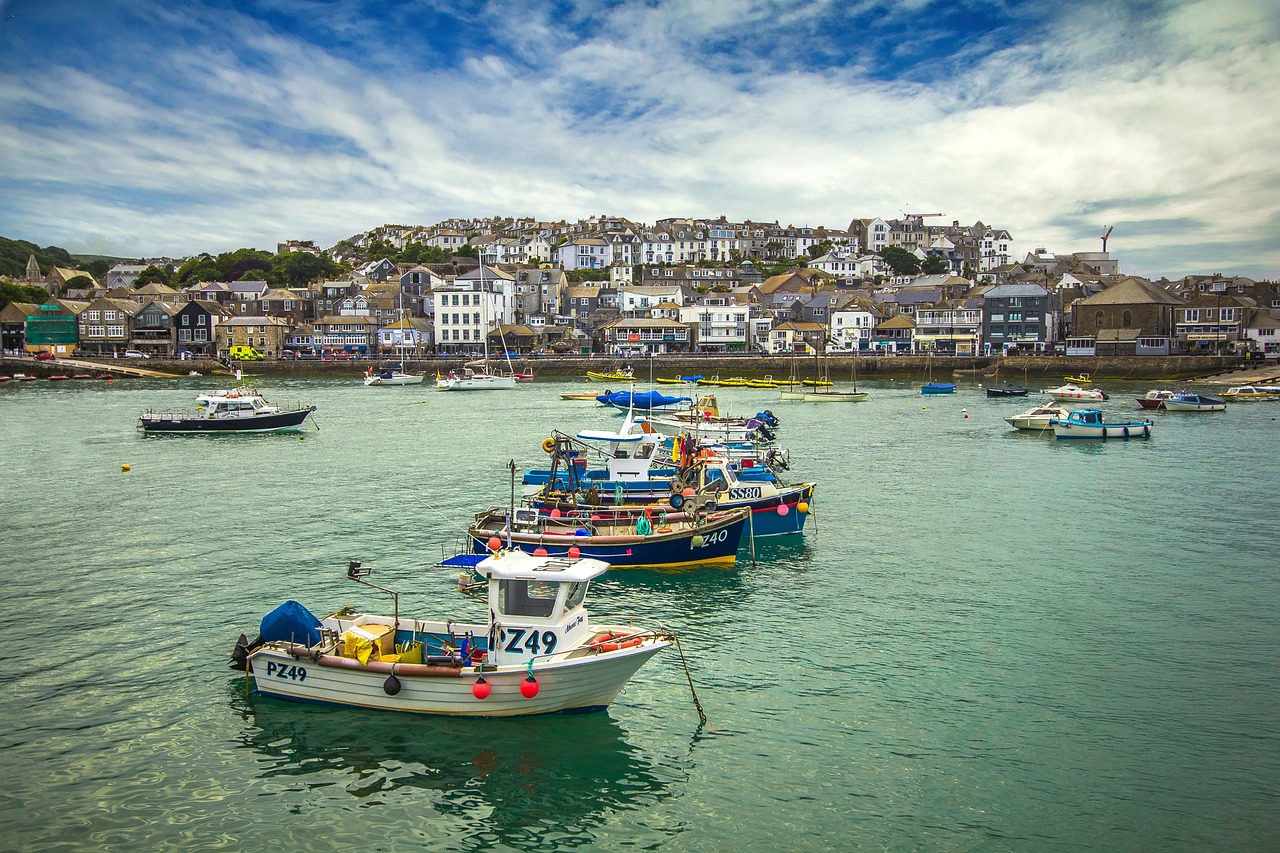
Historical Significance and Evaluation
Henry IV of France, also known as Henry the Great, left an indelible mark on French history with his reign. His rule marked a turning point in the turbulent era of the French Wars of Religion, bringing much-needed stability and unity to the kingdom. Henry IV's ascension to the throne in 1589 came at a time of deep religious conflict between Catholics and Protestants in France. Through his pragmatic approach and policies of religious tolerance, he sought to end the bloodshed that had plagued the country for decades.
One of Henry IV's most significant achievements was the promulgation of the Edict of Nantes in 1598. This landmark decree granted religious freedom to the Huguenots, ending the religious persecution that had fueled much of the conflict. The **Edict of Nantes** not only secured peace within the realm but also paved the way for a more harmonious coexistence between Catholics and Protestants in France.
Henry IV's military campaigns were equally noteworthy, as he displayed strategic prowess and leadership on the battlefield. His victories in key battles such as Ivry and Arques solidified his hold on the throne and bolstered France's position in Europe. By consolidating royal authority and quelling internal dissent, Henry IV laid the foundation for a more centralized and powerful French state.
Furthermore, Henry IV's economic reforms and infrastructure development initiatives were instrumental in revitalizing the French economy and improving the lives of his subjects. His support for trade, agriculture, and public works projects contributed to the prosperity of the kingdom and laid the groundwork for future growth and development.
Tragically, Henry IV's life was cut short by an assassin's blade in 1610, bringing an abrupt end to his transformative reign. Despite his untimely death, his legacy endured, shaping the course of French history for generations to come. Henry IV's legacy is one of resilience, pragmatism, and a commitment to the welfare of his people.
In the annals of history, Henry IV is remembered as a monarch who brought peace to a war-torn land, promoted religious tolerance, and laid the groundwork for France's rise as a major European power. His reign symbolizes a period of renewal and reconciliation in French history, marking a departure from the strife and division of the past.
Throughout the centuries, Henry IV has been immortalized in literature, art, and popular culture as a symbol of enlightened leadership and progressive governance. Writers, artists, and filmmakers have drawn inspiration from his life and reign, depicting him as a visionary ruler who strove to unite a fractured nation.
Today, Henry IV is commemorated and honored in modern-day France through monuments, celebrations, and cultural events that pay tribute to his enduring legacy. His contributions to the nation continue to be celebrated, serving as a reminder of the transformative impact he had on French society and politics.

Depictions in Literature and Pop Culture
When it comes to depictions of Henry IV in literature and pop culture, the King's legacy has inspired numerous works of art and entertainment over the centuries. From plays and novels to paintings and films, Henry IV's life and reign have been a source of fascination for many creative minds.
One of the most famous literary works featuring Henry IV is William Shakespeare's historical play "Henry IV, Part 1." In this play, the character of Henry IV is portrayed as a complex and conflicted ruler, struggling with issues of power, loyalty, and family. Shakespeare's depiction has contributed significantly to shaping the public's perception of the King.
In addition to Shakespeare's play, Henry IV has been a popular subject in French literature as well. Writers such as Alexandre Dumas and Victor Hugo have incorporated the King's story into their works, highlighting his efforts to bring peace and stability to France during a turbulent period.
Henry IV's image has also made its way into the world of art, with many painters capturing iconic moments from his life on canvas. These artistic interpretations often emphasize the King's leadership qualities, his military triumphs, and his commitment to religious tolerance.
Moreover, Henry IV's influence can be seen in modern popular culture, with references to the King appearing in various forms of media. Whether in television shows, video games, or even advertising campaigns, Henry IV continues to be a symbol of strength, resilience, and progressive thinking.
Overall, the depictions of Henry IV in literature and pop culture serve to keep his memory alive and showcase the enduring impact of his reign on French history and beyond.

Commemoration and Memorials
Commemoration and memorials play a significant role in preserving the legacy of historical figures like Henry IV. In modern-day France, the memory of Henry IV is honored through various monuments, celebrations, and cultural events. One of the most notable memorials dedicated to Henry IV is the Pont Neuf in Paris. This iconic bridge, commissioned by the king, stands as a symbol of his vision for urban development and infrastructure improvement. Visitors can walk along the bridge and admire the equestrian statue of Henry IV, a timeless tribute to his reign.
Furthermore, the Château de Pau in southwestern France stands as a lasting memorial to Henry IV's birth and early life. This majestic castle, where Henry IV was born, offers visitors a glimpse into the king's upbringing and heritage. The château serves as a reminder of the humble beginnings of a monarch who would go on to shape the course of French history.
In addition to physical monuments, cultural events and celebrations also commemorate Henry IV's legacy. Every year, on the anniversary of his assassination, tributes are paid to the king through ceremonies and reenactments. These events not only honor Henry IV's memory but also educate the public about his contributions to France.
Frequently Asked Questions
- What were the key events in Henry IV's early life?
Henry IV's early life was marked by political turmoil and challenges. Born as Henry of Navarre, he faced opposition due to his Protestant faith and was embroiled in the French Wars of Religion. Despite these obstacles, he eventually ascended to the throne as Henry IV of France.
- How did Henry IV promote religious tolerance?
Henry IV is renowned for his Edict of Nantes, issued in 1598, which granted religious freedom to Protestants in France. This edict aimed to end the religious conflicts that had plagued the country for decades and fostered a sense of unity among the French populace.
- What were some of Henry IV's significant military achievements?
Henry IV's military campaigns were instrumental in stabilizing France. He won key battles such as the Battle of Ivry and successfully besieged Paris, solidifying his control over the realm. His strategic prowess and leadership skills were vital in restoring peace to the war-torn nation.
- How did Henry IV contribute to the economic development of France?
Henry IV implemented various economic reforms to revitalize the French economy. He focused on infrastructure projects, promoted trade, and supported agriculture, laying the foundation for future economic growth and prosperity in the country.
- What is the legacy of Henry IV and how is he remembered today?
Henry IV's assassination in 1610 did not diminish his legacy. He is remembered as a wise and compassionate ruler who brought peace and stability to France. His impact on the nation's history is commemorated through monuments, celebrations, and cultural events that honor his memory.


